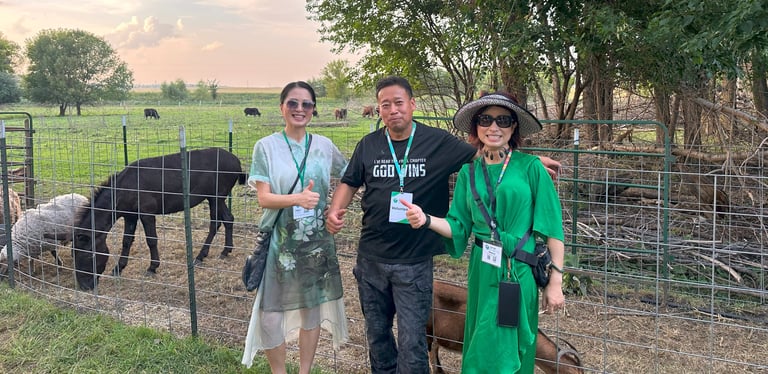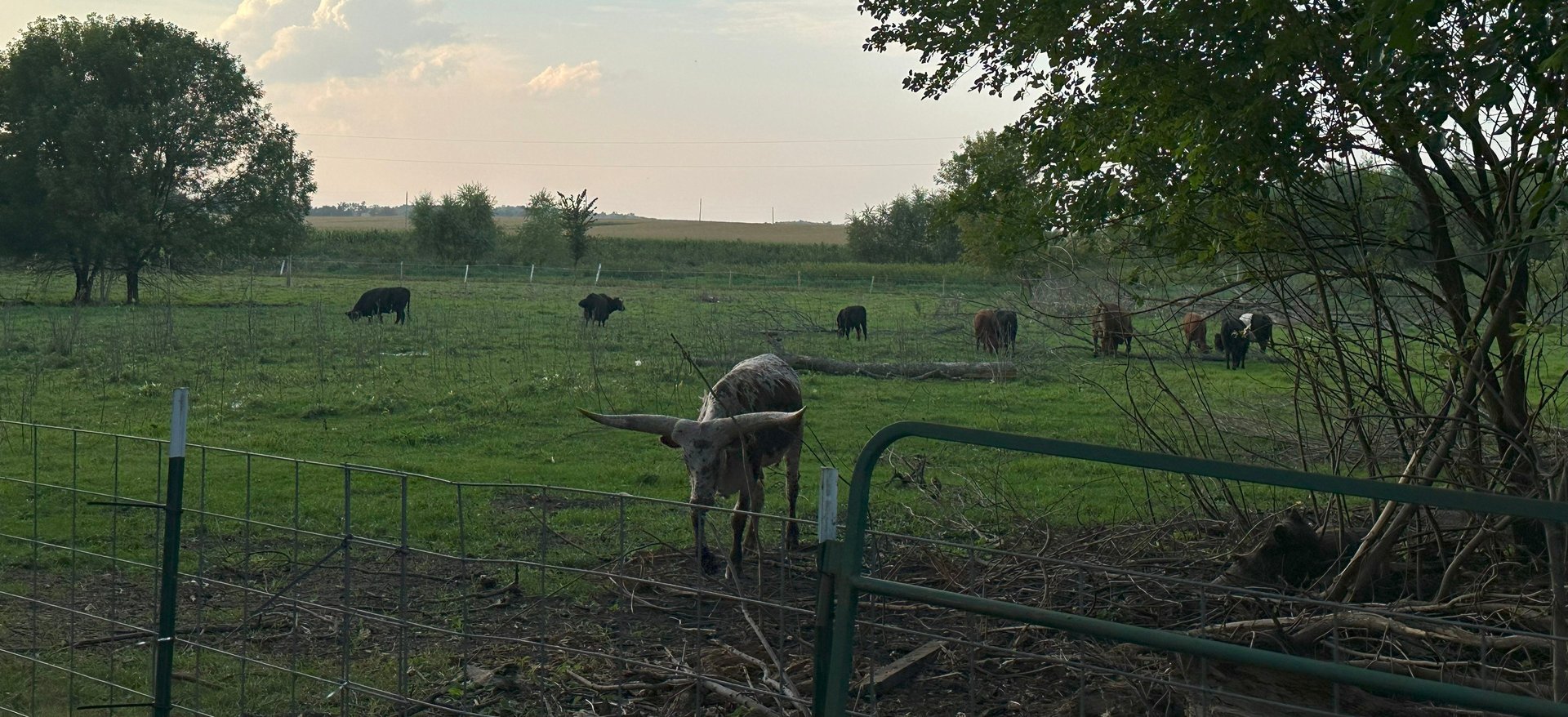
Love and Nature: A Celebration of Environmental Stewardship at a Permaculture Farm
ENGLISHWASTEEDUCATIONRECYCLENATURE
Jing Li & Grace Li
9/20/20257 min read
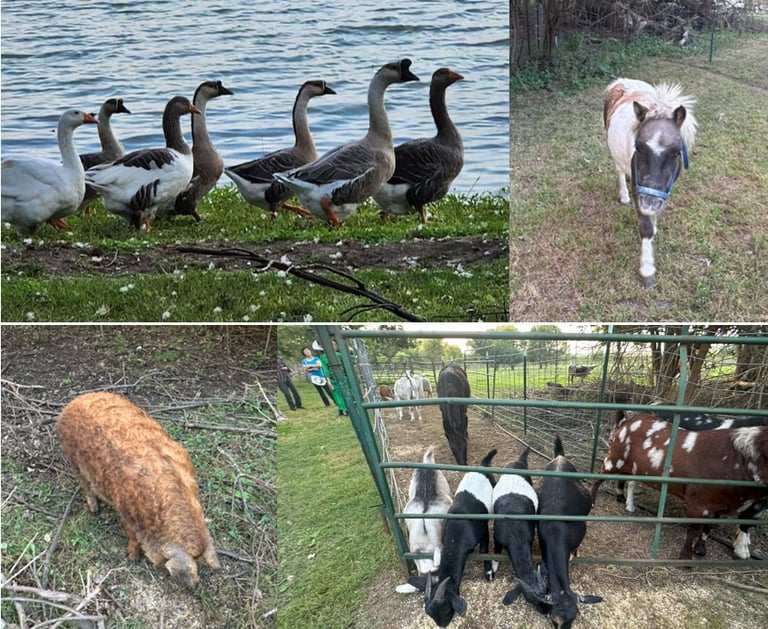

On Saturday, September 14, 2025, a group of nature-loving friends from all over the Twin Cities gathered bright and early at a permaculture farm along the north shore of Greenleaf Lake. The occasion was a celebration of sustainable agriculture and farming that worked with the site’s natural resources rather than against it, and attendees further elevated their love for the environment by learning how to minimize the waste from their festivities.
Permaculture and Sustainable Farming
The event’s host, Mr. Lei Xu, explained that the farm was once an abandoned lakeside residence. It spans approximately 20 acres of land and 1,200 feet of shoreline. Over the past five years, he has been working to transform this land into an organic farm modeled on permaculture (also called sustainable agriculture). Permaculture is a farming or agricultural model that works in harmony with the land’s natural biodiversity. It focuses on developing mutually supportive relationships between plants and animals, as well as the recycling of resources. It is one of the agricultural systems closest to a natural ecosystem.
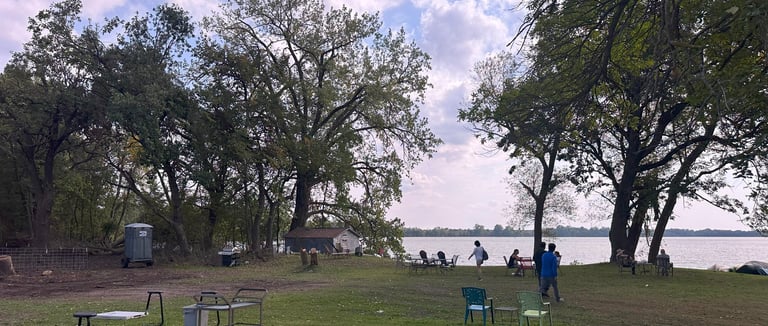

Today, thanks to Mr. Xu’s hard work, the farm is home to more than 500 fruit trees and berry bushes. It raises seven breeds of cattle. Over half are Wagyu; the rest are Texas Longhorns, Belted Galloway, Dexter cattle, Highland cattle, Jersey cattle, and yak. There are eight breeds of sheep, Hungarian Mangalitsa pigs, miniature donkeys, ponies, and birds like emus, peacocks, chickens, ducks, and geese.
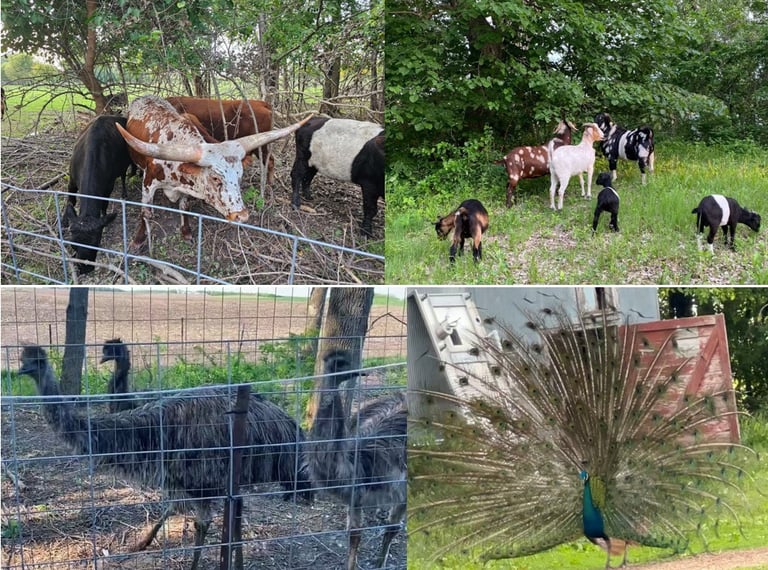

Festivities at the Farm
As guests arrived, some helped start roasting a whole lamb while the host shared sweet glutinous corn from his own fields. Many volunteers were excited to help with the husks. At the farm, corn husks that people in the city would usually throw away are collected to feed the animals.
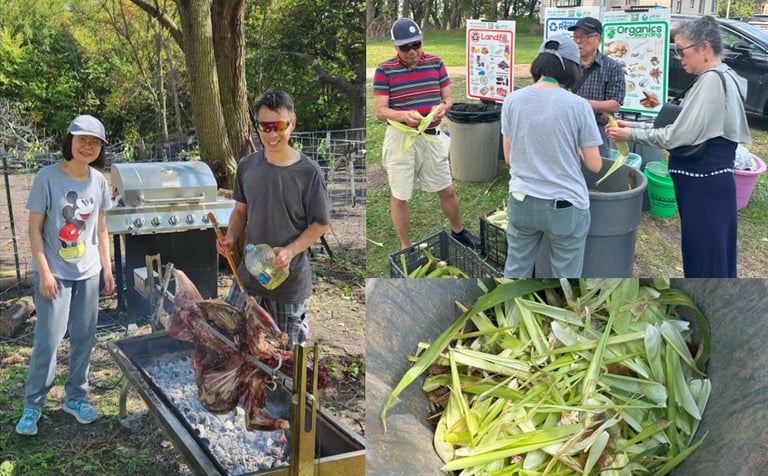

Mr. Xu temporarily enclosed the free-range animals to provide a safer environment for guests, especially the children, to interact with them. He even set up many fun activities, like a trampoline. Surrounded by trees and open lake views, parents could eat and converse while they watched their children laugh and play.
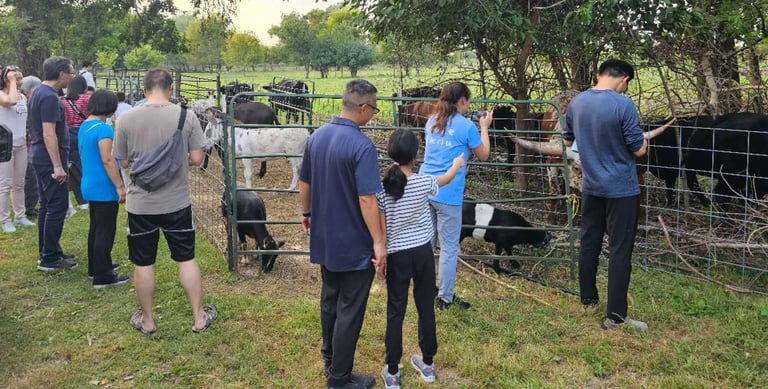

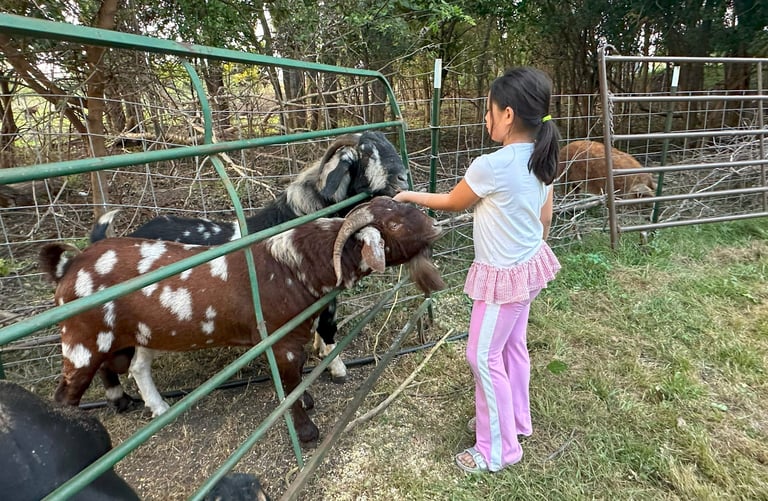

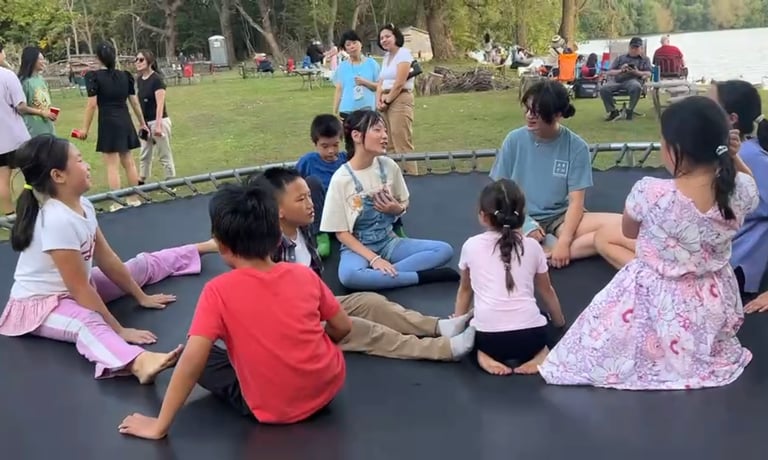

When most of the guests had arrived, Mr. Xu warmly welcomed everyone, marking the beginning of this delightful gathering.
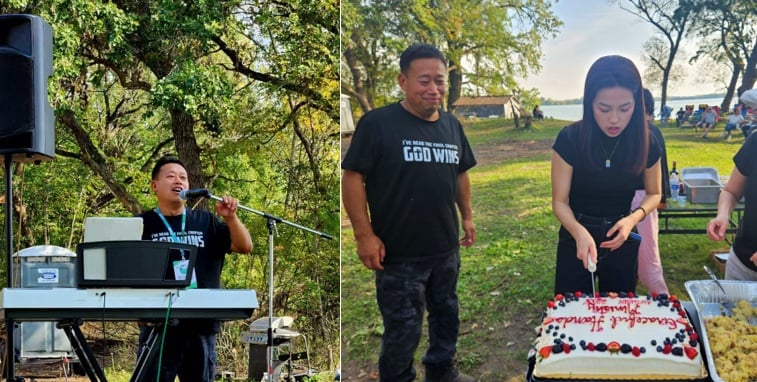

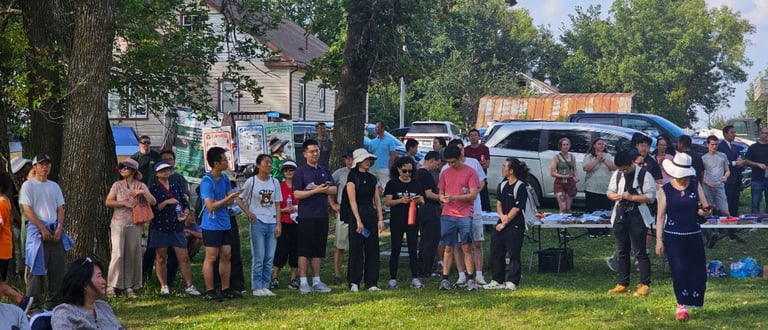

Minimizing Waste and Maximizing Sustainability
The co-founders of ZIRAN, Jing Li and Dan Li, had heard about the farm earlier at a Shandong Hometown Association gathering organized by Mr. Xu, and they were excited to finally visit. Arriving early, they set up a minimal waste station and put away scattered trash bins around the farm. Their experience had taught them that without guidance or signage, attendees would inevitably create more landfill waste than they intended.
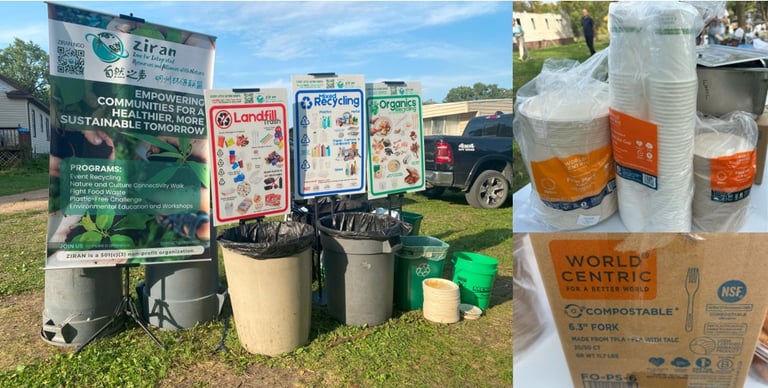

This is because when people mix too much non-recyclable waste into the recycling bin, the waste management company treats the entire bin as garbage and sends it to the landfill. ZIRAN’s co-founders ensured that proper signage was displayed to help attendees sort out as many compostable materials as possible and avoid contaminating their recycling materials.
Fortunately, the event volunteers had intentionally purchased compostable food service ware. Guests also reminded each other to bring refillable bottles instead of disposable plastic ones, much like on a camping trip. All these decisions resulted in much less landfill waste generated from the gathering.
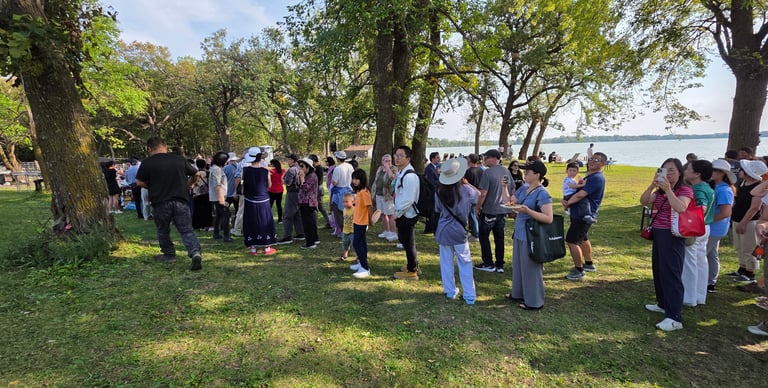

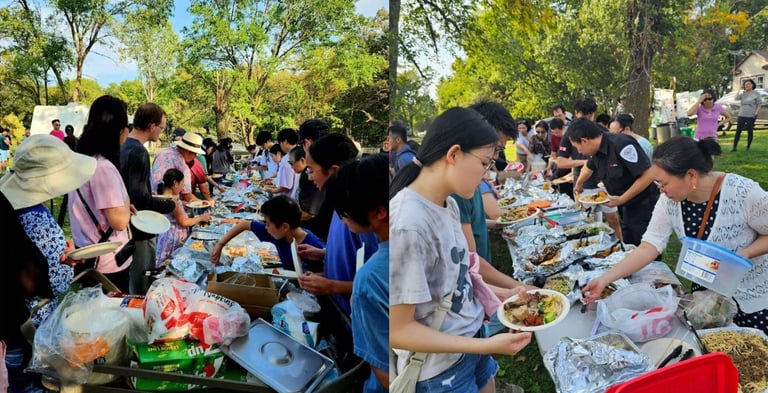

As lunch started, Jing Li introduced ZIRAN’s missions and the importance of proper recycling. She highlighted the value of composting and other forms of organic waste recycling. People who take the time to recycle their organic waste can transform their scraps into nutrient-rich compost that can feed plants and gardens. Organic waste recycling is also an important step toward reducing landfill waste, as approximately 25% of household trash is composed of organic materials. Finally, composting and other organic waste recycling prevent the release of methane that happens when food decomposes in landfills. Methane is the primary component of natural gas and a potent greenhouse gas. Accordingly, reducing the amount of food waste going to landfills not only helps keep our land cleaner but also helps combat climate change.
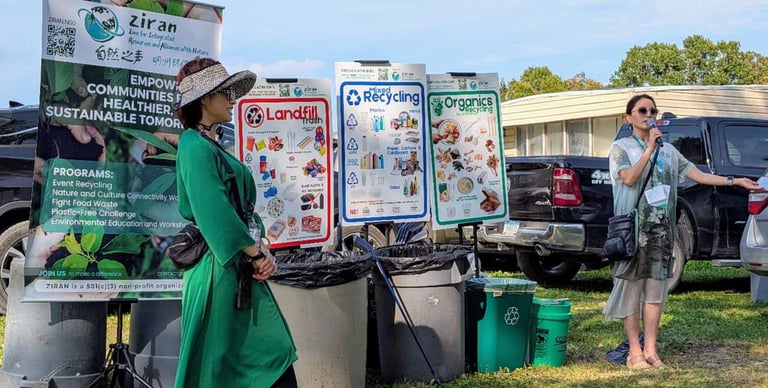

Some of the guests at the event were already familiar with the facts about organic waste recycling and waste reduction, but the information was new to others. Many people found the information enlightening and started lively conversations with the ZIRAN team.
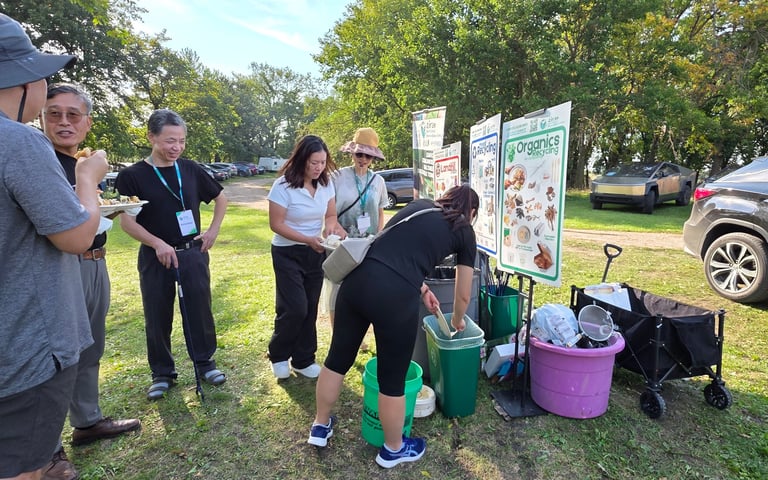

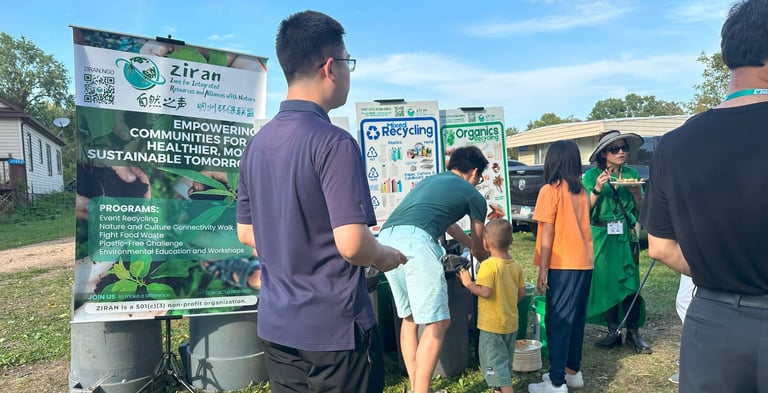

After enjoying their food, guests carried their plates to the waste station. Thanks to clear signage and volunteer guidance, they quickly learned what could be composted, what could be recycled, and what had to be sent to the landfill.
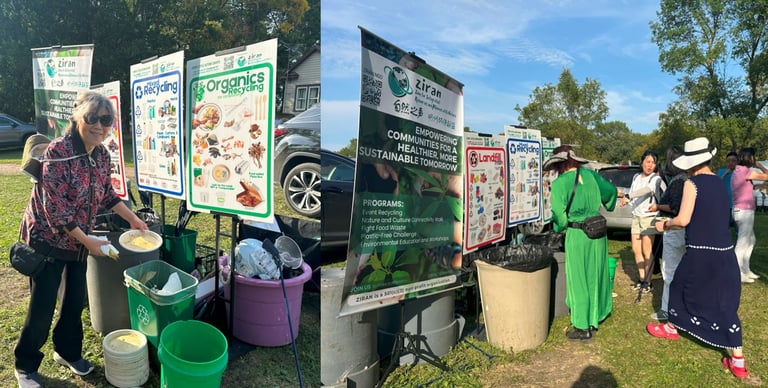

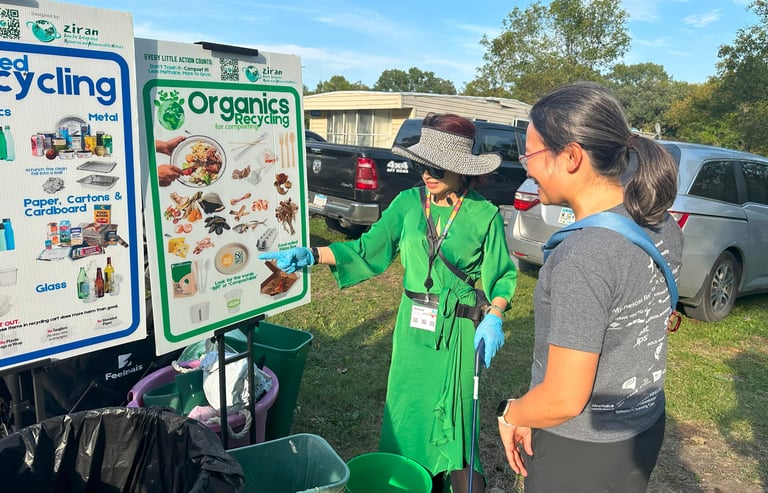

Curious participants lingered to ask questions. Others who had already learned how to properly sort their waste volunteered on the spot to help others correctly sort their compost, recycling, and landfill waste.
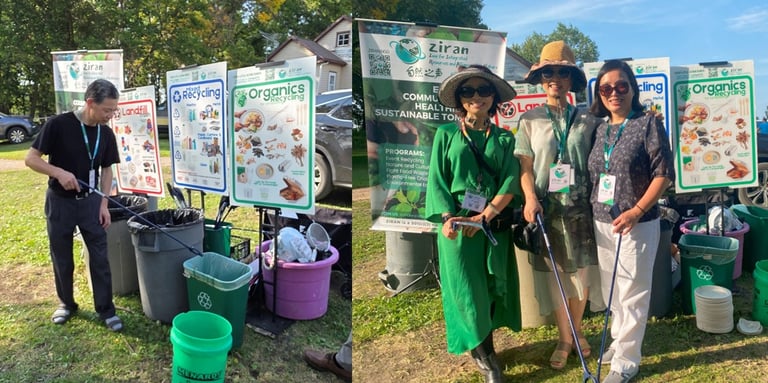

One such helper was Richard, a leader from the West Metro Chinese Church (WMCC). He picked up a trash grabber to help pull trash out of the recycling and compost. ZIRAN met Richard roughly one year ago at a dinner party at WMCC, where they guided the waste sorting.
WMCC started sorting their waste at all their gatherings ever since. With a year’s practice, Richard and other church members had become highly proficient. At the end of the day, Richard even volunteered to take the recyclables to the city station for drop-off. Since the farm is located in a rural place, there is no municipal collection service provided.
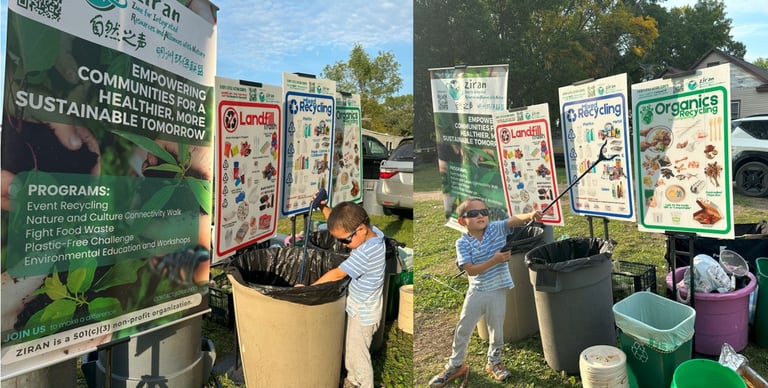

Another helpful volunteer was a young boy who was just tall enough to peek over the bin. After learning that napkins and paper towels can be recycled as organic waste, he took a trash grabber and stationed himself by the bin, carefully fishing out misplaced tissues one by one. Though he struggled a little with the size of the tool, he remained determined. Working diligently, he successfully transferred every misplaced napkin or paper towel from the recycling and landfill to the organic waste bin. The boy was small in stature, but he embodied a great will to keep our earth clean.
Results Worth Celebrating
Thanks to everyone’s collective effort, this gathering of 200 people produced less than half a bin of landfill trash. Instead, the guests diverted the day’s waste into one bin of recyclables, three full bags of food scraps, and one bag of compostable plates, which were neatly stacked to save space. Additionally, compostable forks and chopsticks were separated to avoid tearing the bags, and aluminum pans were rinsed and stacked for recycling. Ultimately, the event achieved a waste diversion rate of over 70%.
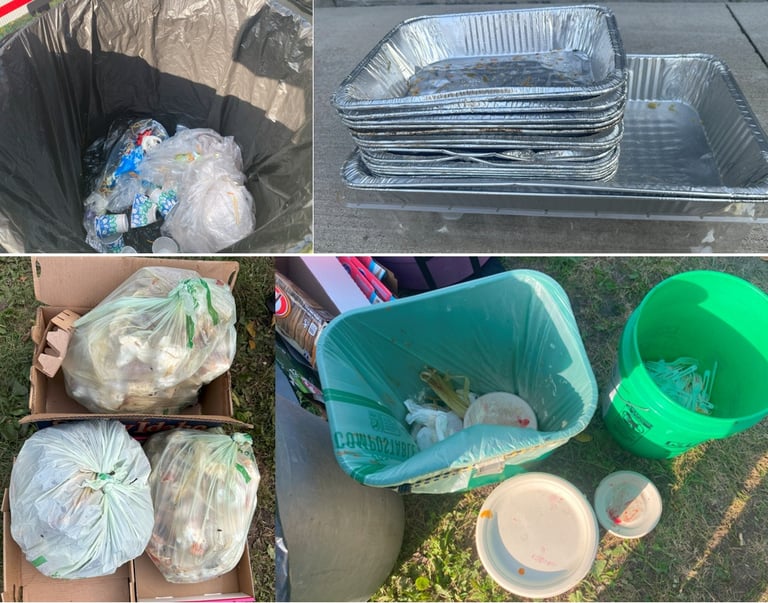

Even more inspiring, Mr. Xu explained that there was no need to haul the organic food scraps to a distant commercial composting facility. They could be used directly to feed animals here. No food was wasted, and resources were returned to the land, fully embodying the key concept of recycling resources in permaculture.
At the close of the event, Grace Li shared her heartfelt thanks for everyone’s participation:
“We are so grateful to Mr. Xu for opening this beautiful farm to everyone! He has prepared for weeks for this event, day and night. Today’s special ‘Love and Nature’ gathering gave us a chance to escape the noisy city and enjoy a joyful autumn day in the peaceful countryside. Thanks also to every friend who helped keep the event clean. ‘Many hands make light work!’ Because of teamwork, we managed the waste quickly and effectively. We couldn’t have done it without you. We wish Mr. Xu’s farm continued growth and success!”
Looking into the Future
After the party, Mr. Xu spoke about the farm’s future. Instead of pursuing a commercial, single-crop model, he intends to continue to maximize the farm’s biodiversity. He hopes he can use his farm to spark children’s interest in nature, encouraging them to step away from screens and games. As a result, some of Mr. Xu’s development plans include more family-oriented activities, such as fruit picking, animal adoption, grafting workshops, and learning how to start your own orchard.
Within the next few years, the farm’s many fruit varieties will grow and become more abundant, and they will cater to more people’s needs: 15 types of apples, 15 types of pears (including 8 Asian varieties), 10 peaches, 6 apricots, 6 plums, 10 grapes, 4 persimmons, 2 pawpaws, 4 kiwis, and numerous berries.
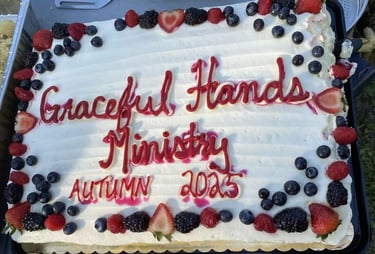

Part of the farm also operates as a registered nonprofit, Graceful Hands Ministry, to serve children with autism and patients battling cancer. Mr. Xu took advantage of this day of celebration to formally introduce the nonprofit to the public. To further the nonprofit’s goals, the farm will feature a Noah Petting Zoo and a Song of Songs Garden, as well as a diverse orchard and greenhouses that showcase all the plants mentioned in the Bible.


Guests expressed their deep admiration for Mr. Xu’s vision and compassion. With one farm, he was sharing the cutting edge of permaculture practice with the community, connecting children with the beauty of nature, and planting seeds of hope for the future. Together, we look forward to more stories of “Love and Nature” unfolding here on the lakeshore farm.
